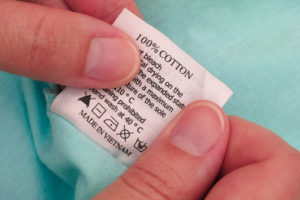Do Treble Damages Count toward the Amount in Controversy for Federal Jurisdiction?
This post concerns an intriguing question of civil procedure.
We wrote a few years ago about whether the trebling feature in N.C. Gen. Stat. § 75-16 can be used in calculating the minimum amount in controversy required to designate a case to the North Carolina Business Court.
We look in this post at a similar question in federal court. The monetary threshold for federal diversity jurisdiction is $75,000. Can a removing party use the trebling feature in section 75-16 to nudge the amount in controversy over that threshold?
The answer is yes, according to a recent decision from the United States District Court for the Middle District of North Carolina. In Quality Labels v. Wells Fargo Bank, N.A., Judge William L. Osteen, Jr. denied a motion to remand on the ground that federal jurisdiction was present, even though the plaintiffs sought only $42,000 in damages. This was because the plaintiff alleged a violation of section 75-1.1.
The plaintiffs in the case—Quality Labels and one of its foreign affiliates—print labels for textile products in the United States and Central America.
In late 2017, Quality Labels ordered materials from Ritrama, a supplier in Guatemala. Ritrama sent Quality Labels the materials, along with invoices totaling about $42,000.
At this point, we meet defendants Andrew Robertson and his shell company, Drew’s Lounge LLC. Quality Labels alleged that Robertson and Drew’s Lounge opened a checking account in February 2018 at Wells Fargo Bank and then used fake email addresses associated with Ritrama to persuade Quality Labels to wire payment for the Ritrama invoices to that new Wells Fargo account. Quality Labels did so, and Ritrama was never paid.
When it found out what happened, Quality Labels sued Robertson, Drew’s Lounge, and Wells Fargo in Forsyth County Superior Court. Robertson and Drew’s Lounge never appeared, and Wells Fargo removed the case to federal court based on diversity jurisdiction.
Quality Labels moved to remand. They argued that they never intended to seek more than $42,000.00 plus $10,000.00 in attorney’s fees, and that their second amended complaint—filed after removal—expressly said so.
Wells Fargo argued that the amount in controversy for diversity purposes is assessed at the time of removal, so the second amended complaint did not affect whether jurisdiction existed.
There’s No Controversy: Trebling Counts toward the Amount-in-Controversy Threshold
Judge Osteen agreed with Wells Fargo. It is well established that the amount in controversy is determined at the time of removal.
Thus, the second amended complaint—filed three days after removal, and two days after the motion to dismiss—had no bearing on the amount in controversy.
Judge Osteen then examined the first amended complaint, the operative pleading at the time of removal, to assess whether on its face there was more than $75,000 in controversy. That complaint included a section 75-1.1 violation among its seven claims. It also asked for punitive damages.
Each of the first six claims sought either the $42,000 that Quality Labels wired into the Drew’s Lounge checking account at Wells Fargo or made a blanket statement that Quality Labels was entitled to damages in an amount exceeding $10,000. For its section 75-1.1 claim, Quality Labels asked that its damages be trebled under section 75-16.
Judge Osteen concluded that each of the six causes of action asserted an alternative legal theory to recover for the same injury, the loss of the $42,000 allegedly wired into the Wells Fargo accounts. Therefore, the amounts could not be aggregated for purposes of meeting the federal amount-in-controversy requirement.
He recognized, however, that if Quality Labels were to recover that amount under its section 75-1.1 claim, that amount would be trebled. Because the trebled amount exceeded the $75,000 threshold, Judge Osteen denied the remand motion.
On Diversity Jurisdiction, the Complaint Is King
As a last-ditch effort to get back to Forsyth County, Quality Labels argued in its remand briefing that it didn’t intend and doesn’t intend to seek damages that exceed $75,000. Its brief said, “Plaintiffs seek actual damages in the amount of $42,334.72 and $10,000.00 in attorney’s fees totaling $52,334.72 plus interest and costs.”
But as Judge Osteen point out, this assertion couldn’t be reconciled with the plain language of the first amended complaint, which sought trebling of the damages recovered under their section 75-1.1 claim.
Quality Labels, then, underscores the significance of clarity in pleading. If you want to avoid federal jurisdiction, be absolutely clear in your complaint that you are not suing for more than $75,000. A plaintiff’s clear disclaimer that it is seeking less than the jurisdictional limit is ordinarily sufficient to defeat removal.
Of course, if there’s a section 75-1.1 claim, that means exercising even more caution. Especially here, where Quality Labels asserted six separate claims for relief for the same $42,000, the main reason to assert a section 75-1.1 claim was to seek treble damages, which brought its claim above the jurisdictional threshold.
And it may not be sufficient to simply omit the request to treble, as Quality Labels tried to do in its second amended complaint. Because jurisdiction is assessed at the time of removal, Judge Osteen never reached that question.
But section 75-16 states that “if damages are assessed in such case judgment shall be rendered in favor of the plaintiff and against the defendant for treble the amount fixed by the verdict.” That mandatory language suggests that any claim under section 75-1.1 is subject to treble damages, and that a demand over $25,000 could satisfy the federal amount-in-controversy requirement.
Author: Jamie Weiss



